It was a year ago that the momentous oil leak in the Gulf coast exploded onto the national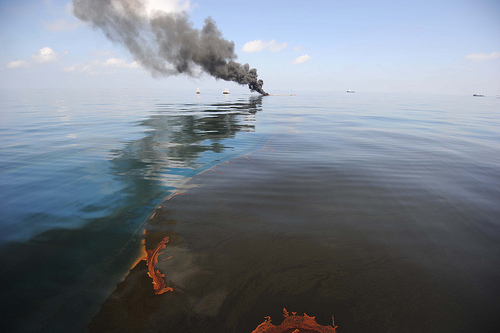 scene, with pictures and videos and news reports and prayer services and a stunning amount of day by day information. I am sure you, too, would say it was hard not to be upset about it. Like other similar, terrible days in our memory—the Exxon Valdez oil spill, Three Mile Island, Chernobyl, Bhopal—I had so many mixed emotions as the disasters were reported and the damage become known. This time, for me, I felt less righteous anger and more deep sadness. Less a desire to rise up for social change and more paralyzed fear and hopelessness (not cynicism or apathy, really, just inertia.) Perhaps I yielded to what the ancients called the sin of sloth–not laziness, really, but an inability to trust God, to rouse one’s self to faithfulness. I wanted to write a bit about it—it is at least something I could do, alerting our friends, civic leaders, students, activists, prayer warriors, thought leaders, pastors and others who read our BookNotes blog, about resources for education and action. Alas, I could not. I’ve felt guilty for a year now and as the sad anniversary pictures—and the governments less than stellar enforcement, and BP’s recalcitrance, well, I feel awful.
scene, with pictures and videos and news reports and prayer services and a stunning amount of day by day information. I am sure you, too, would say it was hard not to be upset about it. Like other similar, terrible days in our memory—the Exxon Valdez oil spill, Three Mile Island, Chernobyl, Bhopal—I had so many mixed emotions as the disasters were reported and the damage become known. This time, for me, I felt less righteous anger and more deep sadness. Less a desire to rise up for social change and more paralyzed fear and hopelessness (not cynicism or apathy, really, just inertia.) Perhaps I yielded to what the ancients called the sin of sloth–not laziness, really, but an inability to trust God, to rouse one’s self to faithfulness. I wanted to write a bit about it—it is at least something I could do, alerting our friends, civic leaders, students, activists, prayer warriors, thought leaders, pastors and others who read our BookNotes blog, about resources for education and action. Alas, I could not. I’ve felt guilty for a year now and as the sad anniversary pictures—and the governments less than stellar enforcement, and BP’s recalcitrance, well, I feel awful.
Now the Japanese nuclear reactors are spilling their poison all over the seas, the wind carrying the low-level radiation who knows where. There are the standard government cover- ups, the out-right lies, the technological optimists who naturally have a gizmo for every social sin. And then there are the witless folks complaining about the media coverage, as if they know that radiation ain’t that bad. They are wrong. Heaven help us.
And this week, those taken with a similar spirit of technological optimism and cavalier attitudes about poison-sharing are minimizing a crisis here in our own beloved state of Pennsylvania. Penn’s Woods, it was once called, purchased fairly by Quaker William Penn. Our backyard nuke plant, TMI, recently failed (another) safety test. One of our own PA Congressmen helped lead the charge in congress to weaken the Clean Water Act. And the natural gas industry has discovered quick and easy ways to obtain the natural gas deposits by a controversial, short-cut popularly called fracking. You most likely have heard of the documentary Gasland (some of it set in Pennsylvania) showing the dangers of this; the scene of fire coming out of the water spigot is enough to give anybody pause. What in the heck are these guys thinking, supposing that such ground water pollution is acceptable? Our new governor, elected in part by the Tea Party right, including beloved neighbors of mine, is giving these guys the green light, big, big time, drilling even in state game reserves.
That is, until the accident last week when a wellhead failure caused a blowout in Bradford County, spilling tainted water into farmlands and streams; most polluted was Towanda Creek, which runs directly into the mighty Susquehanna, which runs into the Chesapeake Bay.
As the spill in Northern Pennsylvania continues its toxic flow—relatively small, compared to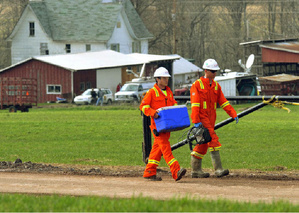 the large Gulf oil disaster—a bit of attention is now being given to the other unsavory practices of these slick natural gas guzzlers, like the controversial practice of dumping waste into rivers, a practice they supported until just months ago. (Oh how I despise their dishonest bill boards all over the place, making them sound so clean and safe and nice!) Even our not-very-green Republican administration this week has called on drillers to stop, as an Associated Press journalist put it, “using riverside treatment plants to get rid of the millions of barrels of ultra-salty, chemically tainted waste-water that gush from gas wells.”
the large Gulf oil disaster—a bit of attention is now being given to the other unsavory practices of these slick natural gas guzzlers, like the controversial practice of dumping waste into rivers, a practice they supported until just months ago. (Oh how I despise their dishonest bill boards all over the place, making them sound so clean and safe and nice!) Even our not-very-green Republican administration this week has called on drillers to stop, as an Associated Press journalist put it, “using riverside treatment plants to get rid of the millions of barrels of ultra-salty, chemically tainted waste-water that gush from gas wells.”
From today’s local paper, an AP story that should have been on page 1, but of course was usurped by stupid stories about Easter egg hunts and such:
The water that flows from active wells is often contaminated with traces of chemicals injected into the wells during a drilling procedure called hydraulic fracturing, or fracking, which breaks up the shale and frees natural gas. The flowback water also brings back from underground such naturally existing contaminants as barium, strontium, and radium.
Worries about the contaminants took on added urgency after the Monongahela River, a western Pennsylvania waterway that serves as a major source of drinking water for Pittsburgh and communities to its south, became so salty in 2008 that people began complaining about the taste.The Department of Environmental Protection responded by curtailing the amount of wastewater sent to plants on the Monongahela. It also wrote new rules barring wastewater treatment plants from accepting more drilling wastewater than already permitted unless they were capable of turning out effluent with salt levels that met drinking water standards.
Those rules, though, left most of the existing wastewater treatment plants alone, and between 15 and 27 continued to pump out millions of gallons of water that scientists said was still high in some pollutants.Over the past year and a half, a handful of researchers, including Jeanne VanBriesen, a professor of civil engineering at Carnegie Mellon University, and Stanley States, director of water quality at the Pittsburgh Water and Sewer Authority, have been collecting evidence on an increase in bromide in rivers that were being used for gas wastewater disposal.
By itself, bromide is harmless, but when combined with the chlorine used to sanitize drinking water supplies, it can produce substances called trihalomethanes that have been linked in some studies to increased human cancer rates after years of exposure or consumption.The industry has, until now, expressed mostly skepticism about any possible link between drilling waste and water quality problems.
When The Associated Press reported in January that some drinking water systems close to gas wastewater treatment plants had struggled to meet EPA standards for trihalomethanes, the article was written off by industry groups as irresponsible, as was a similar report by The New York Times in February that focused on the presence of radium in drilling waste.
You’ve seen Erin Brockovitch. You surely know that tragedies like the BP oil leak do not happen in an ideological, political, or economic vacuum. The Bible teaches that there are “principalities and powers” and it is also clear that we shape cultures based on our deepest idols. We image either the true Creator God or we reflect other false ideologies, for better or for worse. Environmental accidents are not just technological mishaps, but are injustices which occur amidst political decisions, business practices, worldview assumptions, ethical choices, philosophical ideas, leadership failures. They are results of our way of life, based on our ultimate beliefs about things. Former Dutch Parliament member and Christian economist Dr. Bob Goudzwaard (and his co-authors) in Hope for Troubled Times<
/i>: A New Vision for Confronting Global Crisis (Baker; $22.00) are surely right to link ideology and idolatry as we discern the inter-relatedness of the symptoms and the most root cause of social break-down. (Brian McLaren wisely and with great verve raises the same theme in Everything Must Change: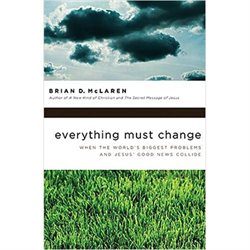 When the World’s Biggest Problems and Jesus’ Good News Collide (Nelson; $14.99) perhaps his most important book, where he shows how a fundamental change in our “framing narrative” would lead to new ways of grappling with the most pressing social concerns.) Granted, often things are not simplistic and there aren’t usually simple “good guys and bad guys” wearing their own white or black hats. That is not to say that there are not good and bad guys sometimes; there surely are. And, sometimes they are one and the same.
When the World’s Biggest Problems and Jesus’ Good News Collide (Nelson; $14.99) perhaps his most important book, where he shows how a fundamental change in our “framing narrative” would lead to new ways of grappling with the most pressing social concerns.) Granted, often things are not simplistic and there aren’t usually simple “good guys and bad guys” wearing their own white or black hats. That is not to say that there are not good and bad guys sometimes; there surely are. And, sometimes they are one and the same.
(In the Pennsylvania case, interestingly, two active natural gas drillers, Range Resources, of Fort Worth, Texas, and Atlas Energy, now a subsidiary of Chevron, had gone to the government and told them that the fouling of streams cannot last and they recommended longer-term solutions. Good for them. They propose shipping the waste to Ohio, which starts in mid-May, I believe. Sigh.)
All of which is to say, again and again, that as God’s people, the church community must be aware of the issues of the day--a la the sons of Issachar of 1 Chronicles 12:23. We must be vigilant to be agents of gospel transformation, and must be voices of justice, also for the land itself. Older mainline liberal churches, under the influence of the mixed-bag of the social gospel tradition several generations ago, used to staff sophisticated social policy advocacy groups; these groups are less active and less influential these days, it seems. (In our state, the state Council of Churches has a public policy specialist who does a great job on these things and we are grateful.) Passionate and often younger evangelicals these days are on the front lines serving the poor, doing third world mission trips, calling for a wholistic faith lived out in action, but they have not been quite so active in engaging the complexities of public policy and structural reformation. Which is why we regularly recommend books about culture and social transformation, titles that help us think broadly about our involvement in God’s world, like the aforementioned Goudzwaard and McLaren. (Think, too, of Andy Crouch’s truly delightful and very helpful Culture Making or James Davison Hunter’s much discussed To Change the World or Michael Slaughter’s Change the World or Brian Walsh & Steven 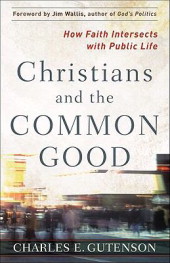 Bouma-Predigar’s Beyond Homelessness or, always, the thoughtful and local reflections of Wendell Berry—try his Sex, Economy, Freedom, and Community for starters. Just out this week is a very readable book which is getting a lot of attention by a former business executive and administrator of Sojourners, Christians and the Common Good: How Faith Intersects Public Life by Charles Gutenson; it is strong on Biblical stuff, progressive in its vision of economic justice, fair and balanced about a host of vexing issues. It has hardly anything about the environmental crisis, though, which is a notable weakness for a primer of this sort.) And we sometimes recommend books on politics and policy engagement, like this little list, which is at our “books by vocation” pages, or this bigger list, offered two years ago to a group of thoughtful lawyers and legal thinkers (scroll down to the second half for more political books.) These kinds of lists we hope are useful to inspire us to be salt and light in the world and we do commend them.
Bouma-Predigar’s Beyond Homelessness or, always, the thoughtful and local reflections of Wendell Berry—try his Sex, Economy, Freedom, and Community for starters. Just out this week is a very readable book which is getting a lot of attention by a former business executive and administrator of Sojourners, Christians and the Common Good: How Faith Intersects Public Life by Charles Gutenson; it is strong on Biblical stuff, progressive in its vision of economic justice, fair and balanced about a host of vexing issues. It has hardly anything about the environmental crisis, though, which is a notable weakness for a primer of this sort.) And we sometimes recommend books on politics and policy engagement, like this little list, which is at our “books by vocation” pages, or this bigger list, offered two years ago to a group of thoughtful lawyers and legal thinkers (scroll down to the second half for more political books.) These kinds of lists we hope are useful to inspire us to be salt and light in the world and we do commend them.
I am on a roll preaching to the choir, here, I suppose, and it should be evident that the Bible teaches what might be called a green theology–a strong emphasis of the doctrine of creation (what Calvin called “the theatre of God.”) At Easter we recall that Christ’s bodily resurrection points to a new creation that certainly includes a renewed call to care for the Earth. N.T. Wright’s Surprised By Hope gets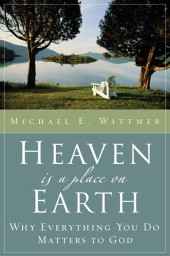 at this as do fine books like Albert Wolter’s Creation Regained or Michael Witmer’s very nice Heaven Is A Place On Earth. Stewardship and development of the potentials of a good (if fallen) creation are central to a Christian way of seeing life. As we celebrate God’s good creation, confess our sinful role in adding to the dysfunction of a fallen world, and affirm that only Christ can rescue us (we cannot do it ourselves) and that he does His restoring work on the cross, we realize that at the very heart of Christian theology is a serious, non-negotiable commitment to care for the world God has entrusted to us, the world that we messed up and that He has graciously saved. Empowered by the Spirit, under the authority of the now ascended King, we are to humbly go about our business, in deeds of humility, reclaiming God’s world from brokenness and despair (and yes, pollution and degradation.) We are to re-claim that original cultural mandate, nicely summarized in Genesis 2:15, to tend and keep the garden. Part of what it means to be human is to not only be a fellow-creature but to be a caretaker of it all.
at this as do fine books like Albert Wolter’s Creation Regained or Michael Witmer’s very nice Heaven Is A Place On Earth. Stewardship and development of the potentials of a good (if fallen) creation are central to a Christian way of seeing life. As we celebrate God’s good creation, confess our sinful role in adding to the dysfunction of a fallen world, and affirm that only Christ can rescue us (we cannot do it ourselves) and that he does His restoring work on the cross, we realize that at the very heart of Christian theology is a serious, non-negotiable commitment to care for the world God has entrusted to us, the world that we messed up and that He has graciously saved. Empowered by the Spirit, under the authority of the now ascended King, we are to humbly go about our business, in deeds of humility, reclaiming God’s world from brokenness and despair (and yes, pollution and degradation.) We are to re-claim that original cultural mandate, nicely summarized in Genesis 2:15, to tend and keep the garden. Part of what it means to be human is to not only be a fellow-creature but to be a caretaker of it all.
The Hebrew word shamar, (to keep) that gives us our primordial human vocation is the same word that shows up often in Biblical blessings—as in, ‘may the Lord watch and keep you, make His face to shine upon you, to give you peace’ That is, we are at least to protect, hopefully even bless and enhance, that which is in our keeping. We are called to blessed creation care. We are called to Christ-like service to our fellow-creatures, protecting, at least.
So, here are some books about all this. We have more. Too many, actually, for a sensible business, since so few sell. It breaks my heart to know that so few of these kinds of resources are well-known, most not on the shelves of church libraries or resource centers, not selling well at most Christian bookstores. Some fine green titles quickly go out of print since customers do not buy them from the stores, or the stores don’t by them from the publishers. (Some stores refuse to stock them, even, which is another sad story.) We hope you understand our desire to be known as a place which desires to glorify God by making available these kinds of books, because we believe they do glorify God; creation care pleases Jesus, who obviously spoke often of plants and animals, and counseled us to “consider the lilies.” This is faithful, urgent, important stuff. Thanks for caring.
BOOKS ABOUT LOVING THE CREATION
It is my hunch that we will rarely care much about stuff we take little delight in. We must pray that God shapes our desires and that we come to appreciate creation–it is God’s handiwork, after all, and we dare not be cavalier abou
t the things he made, sustains, and says is good. Gee, you’ve read the end of Job, haven’t you? Or the long zoological Psalm 104? Why don’t the Biblical literalists talk about this?
So a few nice books to enjoy, to deepen our delight, to remind us of the awesome wonder of a world.
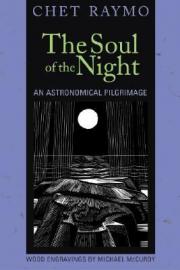 The Soul of the Night: An Astronomical Pilgrimage Chet Rayo (Cowley) $15.95 These elegant essays were first written in the 80s, reissued years later in a handsome paperback with wood cuts illustrating the wonderful prose by this seeker, mystic, scientist and storyteller.
The Soul of the Night: An Astronomical Pilgrimage Chet Rayo (Cowley) $15.95 These elegant essays were first written in the 80s, reissued years later in a handsome paperback with wood cuts illustrating the wonderful prose by this seeker, mystic, scientist and storyteller.
The Wisdom of Wilderness: Experiencing the Healing Power of Nature Gerald May (Harper) $13.99 Many love May’s insightful, pastoral, psycho-spiritual books like Addiction and Grace. Here (with a forward by Parker Palmer) the urbane psychiatrist lets us in on a passion of his life: solo wilderness camping, appreciating the beauty of nature, and a deep belief in the goodness of the journey into the wild.
Surprises Around the Bend: 50 Adventurous Walkers edited by Richard Hasler (Augsburg) $14.99 We’ve really enjoy this nice collection of excerpts of journals written by famous hikers, naming their joy, their insight, their motivation, their struggles and discoveries. A spirituality of hiking? Check out these neat stories by Francis of Assisi, John Bunyan, John Chapman (that would be Johnny Appleseed), John Muir, James Michener, Thomas Merton, Toyohiko Kagawa, Martin Luther King, Henry Thoreau, of course, and dozens more. Even includes reflections by Dietrich Bonhoeffer, Mother Teresa and C.S. Lewis. Who knew they wrote about walking? Take this in your day pack on your next adventure.
Summer: A Spiritual Biography of the Season Edited by Gary Schmidt & Susan Felch (Skylight Paths) $18.99 I’ve written before about the four seasonal volumes that make up a handsome set as they include not only excerpts of great literature, a multi-ethnic global perspective, offering fine ecological insights, but these are books of wondrous beauty–in the subject about which they write, of course, but in the (often famous) writing itself. I’ve listed the summer one, but all four are truly lovely, including poetry, short fiction, memoir, science writing, and selections of the world’s sacred Scriptures. Schmidt and Felch, by the way, teach in the English department of Calvin College in Grand Rapids, MI.
All Creation Sings: The Voice of God in Nature J.
Ellsworth Kalas (Abingdon) $14.00 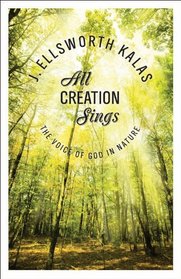 Rev. Kalas is renowned as basic Bible
Rev. Kalas is renowned as basic Bible
study leader, a prolific author of nice books used in adult ed classes
or for basic Christian growth. He is the former President of Asbury Theological Seminary and is a fine writer. Here he turns his attention to what the
Bible says–and, wow, does it say a lot–about the way in which creation
speaks God’s voice. Consider this, among other things, an extended meditation on Psalm 19:1. Or a reflection on the hymn “This Is My Father’s World” from which the title is taken. It is a core Bible teaching that we don’t hear much about. Very nice, with good discussion questions making it very appropriate for a study group, Bible class, reading group or for adult Sunday school use.
Bridges, Paths and Waters; Dirt Sky and Mountains: A Portable Guided Retreat on Creation, Awe, Wonder, and Radical Amazement and Cairn-Space: Poems, Prayers, and Mindful Amblings about the Place We Set Aside for Meaning, Prayer, and the Sacramental Life in the New Monasticism N. Thomas Johnson-Medland (Wipf & Stock) $17.00 & $20.00 respectively We have come to know Tom as a customer and friend and we can tell you he is thoughtful, widely-read, a playful writer, and doing a fine job bringing healthy food to a United Methodist church camp. He’s got a bunch of degrees, a servant heart and a poet’s pen. These are great resources for anybody who wants a spiritual companion for their enjoyment of place and space in the great outdoors, especially if they are drawn to the poetic, mystical and provocative.
Water, Wind, Earth & Fire: The Christian Practice of Praying with the Elements Christine Valters Paintner (Sorin Books) $14.95 I think I have written about this before, and noted that I am nervous about resources that give the impression that we can dabble in pantheism. We are not the creator, the stuff of earth is not divine. That said, this is a fine and innovative way to use the stuff of earth as avenues for, springboards into, and allies towards the spiritual journey, written by a gentle Benedictine sister and artist. It may seem weird for some. For the Psalmists who wrote lines like the ones saying God named the stars and the trees clap their hands, well, maybe it is us who are mistaken, thinking this is so unusual. Beautiful!
Wild Thoughts from Wild Places David Quammen (Scribner) $14.00 Our best scientists have much to teach us, and this is science reporting combined with travel writing. Thrilling, fun, wonderfully written, these are essays about, well, kayaking on the Futaleufu River of southern Chile, black market parrots in eastern Indonesia, and urban coyotes. He’s known for the popular Song of the Dodo and has won the National Magazine Award for science essays in Outside magazine. Enjoy, learn, and be in awe!
American Earth: Environmental Writing Since Thoreau edited by Bill McKibben (Library of American) $40.00 I write about this spectacular collection from time to time, this massive, sturdy hardback with a ribbon marker that includes excerpts from just about everybody in the field: from Walt Whitman to Annie Dillard, from Jonathan Schell to Michael Pollen, from E.B. White to Barry Lopez, from Terry Tempest Williams to Mary Oliver. These are the essential writings that have tried to change how we see our place in the natural world. How could you not want a handy place to read Barbara Kingsolver and John Muir and Wendell Berry and (yes) P.T. Barnum?
High Tide in Tucson: Essays From Now or Never Barbara Kingsolver (Harper) $13.00 For my money this may be the best one-volume collection of essays about nature I’ve read—truly well crafted, challenging and so interesting. I’m sure you know we adore most of her fiction, and Animal, Vegetable, Miracle is a modern classic about homesteading and local eating. This 1995 collection deserves continual acclaim and I can hardly find a better example of the sheer joy of sensible reading. The back cover calls it “defiant, funny, and courageously honest.”
A Weed By Any Other Name: The Virtues of a Messy Lawn, or: Learning to Love the Plants We Don’t Plant Nancy Gift (Beacon) $23.95 Okay, this is a green case for organic lawns and a warning about hazardous herbicides. But it is also a fun and beautiful rumination on what I might say is the goodness of God’s creation, found in the unseemly weed. Love it!
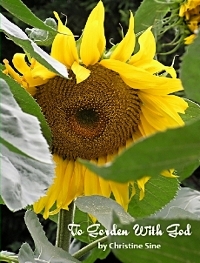 To Garden With God Christine Sine (Mustard Seed Associates) $16.00 My how I respect Tom and Christine Sine, who joyfully have networked folks for years, forming and sustaining communities that think missionally, practice spiritual disciplines, serve the poor, create faithful liturgies and—yep–garden like mad. This emerges out of more than 15 years of gardening experience and offers practical advise, fascinating stories, and solid spiritual lessons about God’s good creation. This is a “must-read” on reviewer of green books wrote, laden with “profound Biblical insights about gardens and gardening…” What a wonderful resource from trusted friends in Seattle.
To Garden With God Christine Sine (Mustard Seed Associates) $16.00 My how I respect Tom and Christine Sine, who joyfully have networked folks for years, forming and sustaining communities that think missionally, practice spiritual disciplines, serve the poor, create faithful liturgies and—yep–garden like mad. This emerges out of more than 15 years of gardening experience and offers practical advise, fascinating stories, and solid spiritual lessons about God’s good creation. This is a “must-read” on reviewer of green books wrote, laden with “profound Biblical insights about gardens and gardening…” What a wonderful resource from trusted friends in Seattle.
Digging In: Tending to Life in Your Own Backyard Robert Benson (Waterbook) $12.99 A few seasons ago I said that this was my favorite little book of the year—a truly lovely, wonderfully written, quiet little memoir of this writer telling about his lawn care—or, I should say, his garden care, since his garden took over his whole yard. He loves his place, his local parish, his neighborhood. Digging in tells us how it is done, with grace and dirt and prayer and work. A writer’s light touch makes this a treasure to read and ponder.
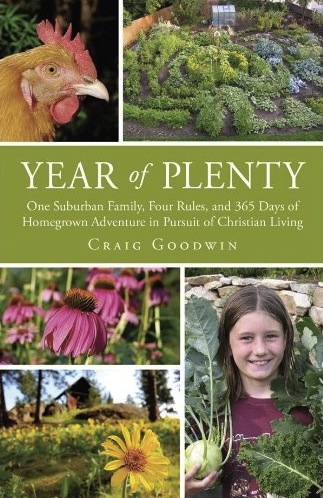 Year of Plenty: One Suburban Family, Four Rules, and 365 Days of Homegrown Adventure in Pursuit of Christian Living Craig Goodwin (Sparkhouse) $12.95 Before I ordered this I had a bit of a chip on my shoulder—hadn’t the publisher known this has been done, a couple of times, by now. Heck I raved about a book Beth and I loved, Plenty. But from the minute it arrived, with a spectacularly beautiful cover and a moving endorsing blurb from Eugene Peterson, I was hooked. Happily, the Goodwin fam has gotten some publicity (from NPR to The New York Times to the thehighcallingsblog) and this may be one of the sweetest new books of the spring. Year of Plenty is well written with charm and insight; Goodwin is a Presbyterian pastor, a farmer’s market manager and a fine educator and neighborhood organizer about preserving food, sustainable lifestyles and the like. Most of all, he’s a fun writer, a deeply spiritual leader who sees the connection between faith and food.
Year of Plenty: One Suburban Family, Four Rules, and 365 Days of Homegrown Adventure in Pursuit of Christian Living Craig Goodwin (Sparkhouse) $12.95 Before I ordered this I had a bit of a chip on my shoulder—hadn’t the publisher known this has been done, a couple of times, by now. Heck I raved about a book Beth and I loved, Plenty. But from the minute it arrived, with a spectacularly beautiful cover and a moving endorsing blurb from Eugene Peterson, I was hooked. Happily, the Goodwin fam has gotten some publicity (from NPR to The New York Times to the thehighcallingsblog) and this may be one of the sweetest new books of the spring. Year of Plenty is well written with charm and insight; Goodwin is a Presbyterian pastor, a farmer’s market manager and a fine educator and neighborhood organizer about preserving food, sustainable lifestyles and the like. Most of all, he’s a fun writer, a deeply spiritual leader who sees the connection between faith and food.
The Spirit of Food: 34 Writers on Feasting and Fasting in God edited by Leslie Leyland Feilds (Wipf & Stock) $20.00 I named this as one of the very best books of the year of 2010 and I again celebrate as a marvel of a book. A few of the essays are as joyfully written as anything I’ve read, beautiful stuff about food, eating, creation and God’s good grace. There is the famous excerpt about onions by Robert Farrar Capon’s Supper of the Lamb, and Denise Frame Harlan’s essay inspired by it. Bon appetite!
Hunting for Hope: A Father’s Journeys (Beacon) $16.00 Only some of this is what might be called “nature writing” and those portions are not the only parts that inspire. Sander’s had an angry confrontation with a son while one a hiking trip—one that was supposed to help their
relationship—and he realized his dark view of the world had hurt his son’s world. You may know Saunder’s is an exceptional, dear, thoughtful writer and he tells of setting out to find sources of hope. It has been called “rare” and “extraordinary” and “a small bright, arrowhead of a book” and is a beautiful example of the personal memoir with huge societal implications. Take heart, parched souls!
The Gift of Creation: Images from Scripture and Earth edited by Norman Wirzba, photographs by Thomas Barnes (Acclaim Press) $39.95 I have touted this beautiful coffee-table book before and couldn’t help but list it here, again. Barns is a stunning, color photographer, and his friend, Norman Wirzba, has compiled a series of top-shelf essays by theologians, Bible scholars and practitioners who offer solid exposition alongside these wonderful nature images. Included are essays by Ellen Davis, Sylvia Keesmaat, Barbara Rossing, William Brown, Cal DeWitt and more. There is a good afterward by Matthew Sleeth. What a handsome gift, lavish and good.
 And, for fun, consider this Bruce Cockburn song from his 2002 album You’ve Never Seen Everything, “Don’t Forget About Delight.” Not about the beauties of creation, only, but a fine, slow, somewhat jazzy reminder…wonderfully cool violin, too. And it ends in a prayer.
And, for fun, consider this Bruce Cockburn song from his 2002 album You’ve Never Seen Everything, “Don’t Forget About Delight.” Not about the beauties of creation, only, but a fine, slow, somewhat jazzy reminder…wonderfully cool violin, too. And it ends in a prayer.
BOOKS THAT REMIND US OF THE URGENCY OF THE CRISIS
Eaarth: Making a Life on a Tough, New Planet Bill McKibben (Griffin) $14.99 I cannot stress enough how important this book is, how readable–despite the horrific stuff he studies–and how helpful it is. It is shocking, yes, and urgent. Even as I write there is record-breaking flooding along the Mississippi; McKibben explains simply how carbon emissions change the amount of heat in the air, causing significantly changed weather patterns. More hurricanes, floods, lightning, forest fires, droughts, and more can be traced to the increase in carbon emissions. Knowing what the melting of the polar ice-caps does to the oceans is fascinating and acute. Still, as passionate as it is, it is not despairing and it is not without it’s moments of joy.
Earth: The Operators Manuel Richard B. Alley (Norton) $27.95 This very handsome and really interesting hardback (almost 500 pages) is the brand new companion volume to the upcoming PBS documentary on climate change and the benefits of renewable energy. This has so much information–and so winsomely presented—it will surely convince those who are skeptical about these matters. The author (a popular geology prof at Penn State and a member of the U.N. Climate Change Task Force) even addresses what some call “climate-gate” and the politicalization of science. I wish this were a cheaper paperback, but it is important enough, and good enough, to be on the short list of books you should consider this season. At least check it out of the library and watch the PBS show airing in April.
Big Coal: The Dirty Secret Behind America’s Energy Future Jeff Goodell (Mariner) $14.95 There are dozens and dozens of books about our polluted air and diminished quality of life. If you were starting with a few, this may be one of the more urgent. Jann Wenner endorsed it saying “Big Coal does for energy what Fast Food Nation did for the American meal.” At least.
The Heat is On: The Climate Crisis, the Cover-Up, The Prescription Ross Gelbspan (Perseaus) $13.00 Fifteen years ago I saw Bill McKibben’s quote “Until you’ve read this book, you’re ill-equipped to think about the planet’s future” and had to stock it. Of course I’d add something like N.T. Wright’s Surprised By Hope or Al Wolter’s Creation Regained to get at the real future promised by Yahweh. But McKibben’s endorsement wasn’t hyperbole and he is right. A classic, still.
Fight Global Warming Now: The Handbook for Taking Action in Your Community Bill McKibben (Holt) $13.00 I hope you know his 360 organization (find how why this number is so important in Eaarth.) This is a book that came from his “step up” team, activists who want to instruct people on what is most important to do, what way to accomplish important goals at a local level, and how to jump-start volunteers with quick, ad-hoc actions that can offer persuasive political pressure.
Why We Disagree about Climate Change: Understanding Controversy, Inaction and Opportunity Mike Hulme (Cambridge University Press) $29.99 Published by the world’s leading scholarly press, this deeply reflective and careful book is rich, very conversant in the natural sciences and the social sciences, in data and the philosophy of science. With head and heart he evaluates the state of the discussion and offers rare balance and calm—dissenting from those who present the crisis in overly alarmist terms and those who are in denial. He articulates the complex arguments in clear prose and offers a “third way” that is well worth considering. Some say this is the most important book leading up to the infamous Copenhagen conference; there is no doubt he has been involved in the research for decades and is one of the most informed scientific voices writing today.
Merchants of Doubt: How a Handful of Scientists Obscured the Truth on issues from Tobacco Smoke to Global Warming Naomi Oreskes & Erik Conway (Bloomsbury) $18.00 (The paperback edition due May 24, 2011.) This won any number of prestigious journalistic and book awards last year, making it a reliable (if admittedly one-sided) expose of how big money has influenced some scientists, as they “sell their soul” to support the unsupportable. There are entire chapters on those who doubted the dangers of tobacco, and of second hand smoke, acid rain, the ozone hole, and especially global warming. This book maintains that the science is settled and only those with vested interests—and they name names and show said vested interests—offer doubts and pseudo-science, to resist regulation and reform. They lay tons of facts on the table to show, as one reviewer put it, “that a key group of figures in global warming denial earned their spurs in tobacco-industry funded attempts to discredit the links between smoking and cancer.” Do you remember the movie The Insider? This stuff is real, folks…
(By the way, in recent weeks we have heard much about conservative evangelicals who perhaps properly express concern about Rob Bell’s failing to mention much about God’s holiness in his book Love Wins. Yet, I must wonder about all those who seem so very interested in that essentail topic: have they not read Proverbs 6 or Isaiah 32:7 or Jeremiah 9:8 about public deception and God’s holy hatred of injustice through lies? Do they not think a holy God finds the sorts of stuff documented in this book to be an abomination? Why don’t they blog on this, for God’s sake? And while exploring that, why not throw in a post on how Hosea 4:3 relates to the Pennsylvania Towanda River spill, the lies about Three Mile Island or of the Deepwater tragedy?)
Something’s Rising: Appalachians Fighting Mountaintop Removal Silas House (University of Kentucky Press) $19.95 This immoral method of blowing up mountains, leaving c
ommunities devastated, is well documented in this moving, powerful, urgent work. Wendell Berry recently said he should have done civil disobedience to stop this decades ago. This injustice against the land and mountain people is a national disgrace. Visit Christians for the Mountains for more down-home info.
Lost Mountain: A Year in the Vanishing Wilderness: Radical Strip Mining and the Devastation of Appalachia Erik Reese (Riverhead) $14.00 Glad this powerhouse of an up-close account of the rapacious coal industry is now out in paperback—read it and weep! It is hard to put down—earned a “starred review” from Publisher’s Weekly.
Living Beyond the “End of the World”: A Spirituality of Hope Margaret Swedish (Orbis) $18.00 On the back of the cover they say this is “a chilling forecast of ecological catastrophe and an outline of the moral and spiritual resources we will need to survive.” Swedish is a seasoned activist, a Catholic advocate for solidarity with the oppressed of Central America. Here, she wonders what sort of human beings must we become if we are going to embody hope in desperate times. This is serious, heavy, and at times very moving.
EXCELLENT BOOKS ON BIBLICALLY-BASED CREATION CARE
Serve God Save the Planet: A Christian Call to Action J. Matthew Sleeth (Zondervan) $14.99 This is especially recommended for being upbeat, interesting, fairly short, quiet easy to follow, with good discussion questions. Thoroughly evangelical, compelling, offering a lot of inspiring ideas.
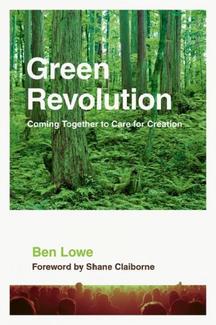 Green Revolution: Coming Together to Care for Creation Ben Lowe (IVP) $15.00 As a young man, Lowe ran for congress; he is passionate, thoughtful, wise, and already accomplished. This recent work is the best book on this topic I’ve read all year– engaging, serious, enjoyable, and full of great testimonies of folks (especially on evangelical colleges) who are doing so very much on this issues. A cool forward by Shane Claiborne will enhance its appeal to fans of Shane’s work and illustrates it’s progressively evangelical vibe. I can’t say enough about this energetic new voice and this excellent introduction to creation care, local activism, stuff that can be done, and projects that cry out to be done. Highly recommended.
Green Revolution: Coming Together to Care for Creation Ben Lowe (IVP) $15.00 As a young man, Lowe ran for congress; he is passionate, thoughtful, wise, and already accomplished. This recent work is the best book on this topic I’ve read all year– engaging, serious, enjoyable, and full of great testimonies of folks (especially on evangelical colleges) who are doing so very much on this issues. A cool forward by Shane Claiborne will enhance its appeal to fans of Shane’s work and illustrates it’s progressively evangelical vibe. I can’t say enough about this energetic new voice and this excellent introduction to creation care, local activism, stuff that can be done, and projects that cry out to be done. Highly recommended.
Green Like God: Unlocking the Divine Plan for our Planet Jonathan Merrit (Faith Words) $16.99 We met Jonathan at the CCO’s Pittsburgh Jubilee conference this past year and he did a fine, fine job. What a good thinker, connecting culturally-influential younger evangelicals with this solid concern about creation care. He’s very articulate, the book is balanced and yet passionate–has has been persuasive in his own Baptist circles and is increasingly sought out as a speaker, writer and preacher. He is on one of the brand new (here is a description of the first four Q DVD Group Studies; I’ll be writing about the 4 brand new ones soon!) Keep any eye on this dude—he’s an important leader and a dear guy who is nicely raising a ruckus in important places.
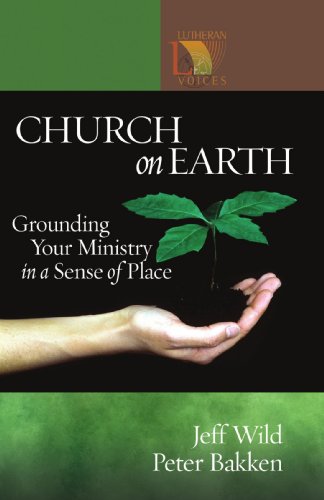 Church on Earth: Grounding Your Ministry in a Sense of Place Jeff Wild & Peter Bakken $10.99 (Augsburg) This small book (80 pages) deserves its own big review, but, for now, please note that it is really a lovely little paperback, easy to read, designed for congregations that want to attend to their local place. Do you remember Wendell Berry’s friend, Wes Jackson, who wrote the seminal Becoming Native To This Place? Or David Orr, a master environmentalist, who advised people to learn about their own watershed, local trees, and such? This is more than a call for local churches to be better stewards, not waste energy and to preach about creation-care. It is about the local congregation, and it’s facility, being a part of the local ecology, attending to and honoring the unique environmental joys and sorrows of its place. There are fine discussion questions, inviting you to reflect on the particulars of your place, wondering how such a theological vision can be generative for “placed” ministry.
Church on Earth: Grounding Your Ministry in a Sense of Place Jeff Wild & Peter Bakken $10.99 (Augsburg) This small book (80 pages) deserves its own big review, but, for now, please note that it is really a lovely little paperback, easy to read, designed for congregations that want to attend to their local place. Do you remember Wendell Berry’s friend, Wes Jackson, who wrote the seminal Becoming Native To This Place? Or David Orr, a master environmentalist, who advised people to learn about their own watershed, local trees, and such? This is more than a call for local churches to be better stewards, not waste energy and to preach about creation-care. It is about the local congregation, and it’s facility, being a part of the local ecology, attending to and honoring the unique environmental joys and sorrows of its place. There are fine discussion questions, inviting you to reflect on the particulars of your place, wondering how such a theological vision can be generative for “placed” ministry.
Our Father’s World: Mobilizing the Church to Care for Creation Edward Brown (IVP) $15.00 Brown is a solid guy–he’s even visited us here at the shop–with a heart not only for environmentalism, but for world missions and congregational renewal. How audacious to think that ordinary churches can do more, that missional perspectives must include care for God’s own handiwork. One world-class Harvard scholar called it “beautiful and inspiring.” The discussion questions are really fantastic!
$15.00 Brown is a solid guy–he’s even visited us here at the shop–with a heart not only for environmentalism, but for world missions and congregational renewal. How audacious to think that ordinary churches can do more, that missional perspectives must include care for God’s own handiwork. One world-class Harvard scholar called it “beautiful and inspiring.” The discussion questions are really fantastic!
Tending to Eden: Environmental Stewardship for God’s People Scott Sabin (Judson) $18.00 There are a number of reasons why this fine work might be the best choice for a starter study; it really does have a fresh voice, provides good attention to global concerns, showing the connections between poverty and ecology. I like the “step aside with” sections which are nice introductions to people you should know, inspiring vignettes about Robert Linthicum, Matthew Sleeth, Calvin DeWitt, JoAnne Lyon, Leroy Barbar, Rusty Pritchard, et al.
For the Beauty of the Earth: A Christian Vision for Creation Care Steven Bouma-Prediger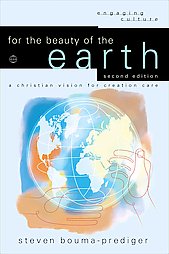
Global Warming and the Risen Lord: Christian
Discipleship and Climate Change 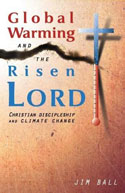
Jim Ball (EEN) $25.00 This book is a nice addition to any creation care library and might be the perfect book to give to one who is somehow suspect or thinks this socially concerned mission is somehow disconnected to our daily walk with Christ. There are some handsome b/w photos here, wonderful stories, tons of great teaching. Interestingly, much of this is just basic discipleship, Christian living 101 so to speak. At most points it is connected to the environmental crisis and the vocation to be stewards of creation, but it really is very clearly about how care for these concerns is rooted in our daily discipleship. There is a lot about social justice and concern for the poor, so the spirituality of creation care is very nicely established, situated in a wholistic vision of Kingdom living. Ball did a great job on this very matter, and he’s got the long-standing credentials to be doing this. The print is also larger than with most books so it would be a fine study for those with older members or anyone who doesn’t like tiny print. Vibrant, fun, handsomely designed pages, a bit challenging, wonderfully connecting basic Christian discipleship in the power of the Risen Lord and the opportunities of our times–this really is great! My friend Rev. Mitch Hescox of the Evangelical Environmental Network (and editor of Creation Care magazine) has a nice afterward, too. Christ is Risen Indeed!
A Climate for Change: Global Warming Facts for Faith Based Decisions Katharine 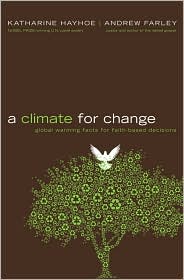
Christianity, Climate Change and Sustainable Living Nick Spencer, Robert White & Virginia Vroblesky (Hendrickson) $16.95 Wow, what a book! Spencer is a thoughtful and reliable theologian who runs a think tank on public theology (in the U.K.) while White is an esteemed science professor at Cambridge University—not too shabby, eh? Ms. Vroblesky is the former National Coordinator of the esteemed evangelical creation care group A Rocha, a group we love, with a faith-based activist bent. Good, good, stuff! This is timely, balanced, helpful, and enjoyable, although not what I’d call introductory or simple. A rave endorsement from Steven Bouma-Prediger and another from Bill McKibben illustrates that his is a book of much, much substance. One of the best.
Christians, the Care of Creation and Global Climate Change edited by Lindy Scott (Wipf & Stock) $17.00 This is a bit of a rare book but I list it because it not only has a stellar cast of participants, evangelicals in the leadership of creation care work, but because it tells the story of how one particular college (Wheaton College, a fairly culturally conservative, evangelical place in the mid-West) reflected on being more green as an institution and what they did about it. You can hear their President, here, deans, students, science professors, facilities operators. What a vision, documenting two major conferences held at Wheaton. McKibben calls it “a milestone.”
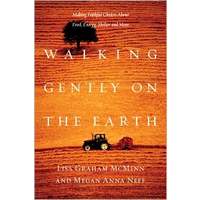 Walking Gently on the Earth: Making Faithful Choices About Food, Energy, Shelter and More Lisa Graham McMinn & Megan Anna Neff (IVP) $16.00 How can I get a whole lot of folks interested in this? Please, please give this wonderful book a chance—it is hopeful and interesting and mature and wise. And captivating. It deserves a large readership, should be a best-seller. Let me tell you why: it is honest, real, beautifully written, theologically clear and yet poetically inspiring and it is hopeful. It has few easy answers, invites deeper conversation, is broad and profound and practical in the very best sense. It is more than a “field guide” for faithful living (although in many ways it is) and it is more than tirade against pesticides and sweatshops. It looks nicely and thoughtfully at alternative energy sources and wonders about how we should arrange our families, our lifestyles, our neighborhoods as we walk through an unjust world. Ms Neff begins each chapter with a vignette that highlights her life in Africa while Mcminn explores the vast implications of Godly stewardship. I have read a wonderful book by McMinn on sexuality and another on spirituality. This is a gem, about beauty and goodness and justice and more. Very provocative and much to ponder.
Walking Gently on the Earth: Making Faithful Choices About Food, Energy, Shelter and More Lisa Graham McMinn & Megan Anna Neff (IVP) $16.00 How can I get a whole lot of folks interested in this? Please, please give this wonderful book a chance—it is hopeful and interesting and mature and wise. And captivating. It deserves a large readership, should be a best-seller. Let me tell you why: it is honest, real, beautifully written, theologically clear and yet poetically inspiring and it is hopeful. It has few easy answers, invites deeper conversation, is broad and profound and practical in the very best sense. It is more than a “field guide” for faithful living (although in many ways it is) and it is more than tirade against pesticides and sweatshops. It looks nicely and thoughtfully at alternative energy sources and wonders about how we should arrange our families, our lifestyles, our neighborhoods as we walk through an unjust world. Ms Neff begins each chapter with a vignette that highlights her life in Africa while Mcminn explores the vast implications of Godly stewardship. I have read a wonderful book by McMinn on sexuality and another on spirituality. This is a gem, about beauty and goodness and justice and more. Very provocative and much to ponder.
Here is what writer Ben Lowe says of Walking Gently on the Earth: “This is a book about change. And hope. Drawing on wisdom from cultures
the world over, McMinn and Neff show us that the call to live well as
part of God’s creation is as urgent as it is ancient, and its faithful
pursuit is as much an art as it is a science. By challenging how we see
the world, they help us understand, in practical ways, that balance is a
thing of beauty, and that celebration and stewardship go hand in hand.”
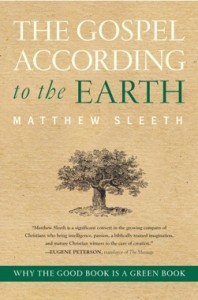 The Gospel According to the Earth: Why The Good Book Is a Green Book Matthew Sleeth (HarperOne) $22.99 Although this strikes me as a bit pricey for a hardback, it is handsome and sturdy and covers so very much stuff it is really a fine book to own. There are oodles of quotes from all sorts of writers from church history, ecumenical and ancient voices we so badly need today. Sleeth’s first book (Serve God Save the Planet) was a quick and wonderful introduction to the environmental crisis and the call to faithful stewardship. This one is a bit more broad, covering well topics such as a simpler lifestyle, very wise counsel about sabbath, the role of music in our lives, how to see creation anew by worshipping well from the Psalms, and much more. Yes, there are good money-saving and stewardly tips but his keen insights are more than just handy ideas; this book can enhance your faith and stimulate your heart anew. Eugene Peterson writes of it, “Matthew Sleeth is a significant convert in the growing company of Christians who bring intelligence, passion, a biblically-trained imagination and mature Christian witness to the care of creation.” Nice!
The Gospel According to the Earth: Why The Good Book Is a Green Book Matthew Sleeth (HarperOne) $22.99 Although this strikes me as a bit pricey for a hardback, it is handsome and sturdy and covers so very much stuff it is really a fine book to own. There are oodles of quotes from all sorts of writers from church history, ecumenical and ancient voices we so badly need today. Sleeth’s first book (Serve God Save the Planet) was a quick and wonderful introduction to the environmental crisis and the call to faithful stewardship. This one is a bit more broad, covering well topics such as a simpler lifestyle, very wise counsel about sabbath, the role of music in our lives, how to see creation anew by worshipping well from the Psalms, and much more. Yes, there are good money-saving and stewardly tips but his keen insights are more than just handy ideas; this book can enhance your faith and stimulate your heart anew. Eugene Peterson writes of it, “Matthew Sleeth is a significant convert in the growing company of Christians who bring intelligence, passion, a biblically-trained imagination and mature Christian witness to the care of creation.” Nice!
These two videos are both arranged with six episodes each. They are interesting, evocative, starting with ruminations one each day of creation, and moving towards living in ways that are green and faithful, serving the planet and serving the poor. I really enjoyed these and can’t imagine a setting where there wouldn’t be good and consequential conversations after viewing them. If you can’t find a group, use them yourself—you won’t be disappointed.
Below, I’ve listed the episode titles for each of the two parts and embedded a video so you can see the promo for the series. Each episode is about 10 minutes or so. Each comes packaged with a very cool guidebook packed with extra Bible verses, outlines, great discussion questions and application suggestions. You can buy the guidebooks separately for $9.99 each. They are very nicely done. Here is a “trailer” for the DVDs.
Hope for Creation: Light, Water, Soil, Heavens, Animals, and Man
Hope for Humanity: Rest, Work, Give, Share, Teach, and Hope
Hope for Creation Film Series Trailer from Blessed Earth on Vimeo.
You can visit the website www.blessedearth.com for other sample clips and other resources, including podcasts from Sleeth and others. Come on back and order from us!
SPECIAL
DISCOUNT
– any book or DVD mentioned –
20% off
order here
takes you to the secure Hearts & Minds order form page
inquire here
if you have questions or need more information
